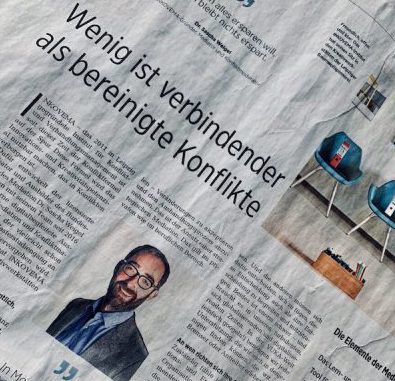Few things are more unifying than resolved conflicts
…or why conflict management is not about removing obstacles, but about innovation and creativity.
(Here unabridged) Interview, LVZ 27 July 2019
Dr Weigel, what exactly is a conflict?
The most difficult question first! Quite different from mediation! Well, in any case, the conflict is regularly not what the conflict parties present. Either their statements resemble crisis reports or they desperately recount how their own ideas for a solution have been rejected. Conflict escalations, for example through threats or speaking out, keeping quiet or involving a lawyer, are usually unsuccessful or ineffective attempts to end the conflict. The effects are usually the exact opposite of the intentions. Even keeping quiet is well-intentioned, but later has to be paid for all the more dearly - with an atmosphere of mistrust. In order to understand conflicts, it is hardly worth defining them. They are an expression of our social and communicative influence on others. We must learn to understand this.
"If you want to spare yourself everything, you'll be spared nothing."
Why do conflicts upset us so much?
Because we only experience conflicts in relationship situations and thus in relational dependency situations. In this sense, conflicts are Interdependency situationsIf one person doesn't want to, two people can't argue. Their own image of the relationship is disappointed by reality. The imaginary worlds that relate to the near or distant future collapse on both sides. It is not so much a clash between the two ideas (these are more likely to be hasty and often unsuitable solutions!) Rather, their own ideas collapse.
A readjustment is pending, which cannot be achieved without the other person – or not at all. This means that every working relationship has the potential for conflict, which initially manifests itself as a dance around the interpretation and shaping of the relationship - and later, when it escalates, in the attempts to convince each other, if it comes to that, can be understood as a struggle for influence and power struggles. What is needed, however, is to accept the - long since real - (relationship) changes and to accept the upcoming negotiation process. This is not initially about trying to find a solution to save the old conceptions, but about a process of clarifying which current conceptions exist, are effective and to what extent they fit together and result in a new shared conception. This is the approach of strategic mediation. This applies in both the private and professional sphere.
When should you intervene in conflicts in a professional context?
As a manager, when the overall strategy or the objectives of the respective department are at risk. Demand cooperation, maintain diversity and thus indecision for a limited period of time - and then organise decisions and decision-making processes. Diversity can (and should) have an enriching effect for a while. That is the essence of organisations. They are decision-making machines. The great art of conflict management is to process this tension between indecisiveness and the need to make decisions in a unifying way.
Both sides have an enormous responsibility to each other here: those who are more powerful must take care to hear and listen to the others. and incorporate their intentions into the decision. And the others must decide to comply, to recognise this decision as their decision and to support it. Both are extremely difficult - and necessary in our turbulent, globalising and digitalising times. In the VUCA world (just google it!), we need all the support we can find, even from those who we perceive as holding us back or driving us forward.
"In moderation and mediation, the future is up for debate, even if the past sometimes seems to stand in the way."
Who are your offers aimed at?
I feel responsible for functionaries and decision-makers in organisations. In other words, for company managers, team leaders and project managers who want to create something new and with others - and who are creative and approach conflicts with this in mind.
Why is conflict moderation and mediation becoming increasingly important?
Because, on the one hand, our closer networking and interconnectedness due to globalisation and digitalisation increases our communication density and, precisely because of this, we need spaces for discussion and understanding in which we can experience space and time in a direct and qualitatively new way. This is the reason why strategy and clarification workshops, for example, are increasing in quantity and quality at all corporate levels, not just for top managers. (They all say we don't really have time, then do it and lock themselves away for a day or two… and – lo and behold – everyone is happy and feels realigned.
That is precisely our opportunity with digitalisation, in the second machine age, so to speak. So – yes, let's use technology to become faster and more efficient and then slow down again together and act strategically and wisely in a joint reflection.
They not only offer conflict management and mediation training, but are also actively involved in the academic debate.
The institute operates at the intersection of practice, education and science. As a scientist and lecturer at the University of Halle, the connection and cross-fertilisation is important to me. We utilise very different opportunities here: In addition to specialist articles, books and lectures, we have been running a blog for years, developing podcasts with the Internet radio station detektor.fm and providing information on mediation and out-of-court conflict resolution free of charge in a monthly newsletter. In future, we will bundle all these activities on our learning and knowledge management tool "Elements of Mediation".








Leave A Comment